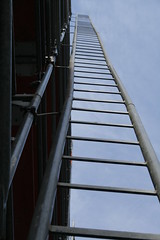Did you ever suspect that some leaders fear success more than they do failure? If they aim high and hit their target once, how can they possibly replicate the last success next time? And especially if they do, won’t people start to have ever higher expectations of them?
Because of that fear, these kinds of leaders learn to play it safe or take mild risks at most. As a result, they never reach their own potential and even worse, they don’t help a community develop its capacity for greatness. I’m not sure who coined the phrase, “the fear of falling up,” but it certainly captures this attitude toward the apprehension of the consequences of success.
In one midrash (rabbinic commentary) on a famous scene in this week’s Torah portion (Vayetze, Genesis 28:10-32:3), we find an acknowledgment of this very fear. The Biblical partriarch, Jacob, envisions angels ascending and descending a ladder to heaven. According to this midrash, God beckons Jacob to climb the ladder, but Jacob declines. He reasons that he will eventually have to descend, so why risk the climb? He does not consider that although he will have to descend, who is to say that he won’t be able to climb to the top again?
Jewish leaders-and indeed all leaders-can follow two basic paths. They can be content to reach for the “low hanging fruit” and play it safe. Or, they can exercise genuine leadership, and “reach for the stars,” acknowledging that they will only reach them some of the time. What kind of leader do you aspire to be?
B’shalom,
Rabbi Hayim Herring



